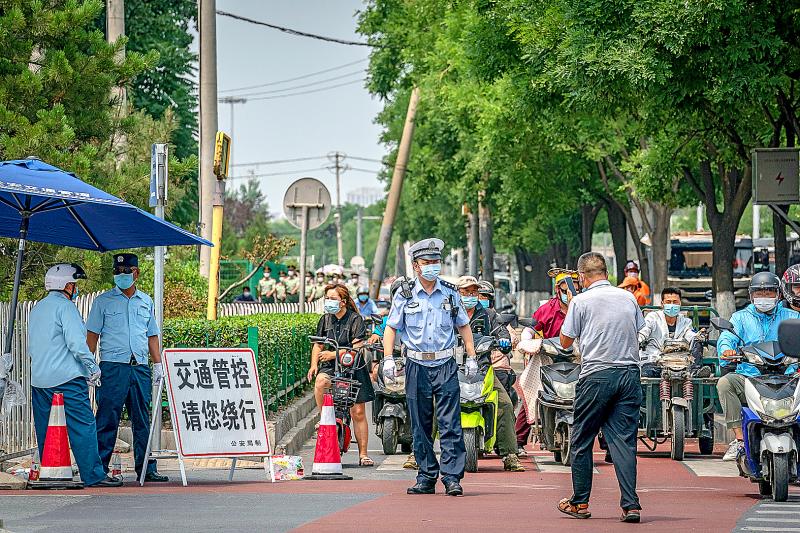A Beijing district yesterday put itself on a “wartime” footing and the capital banned tourism and sports events after a cluster of novel coronavirus infections centered around a major wholesale market sparked fears of a new wave of COVID-19.
Forty-five people out of 517 tested with throat swabs at the Xinfadi market in the city’s southwestern Fengtai District had tested positive for the virus, district official Chu Junwei (初軍威) told a news briefing.
None were showing symptoms of COVID-19, he said, but added that 11 neighborhoods in the vicinity of the market, which claims to be the largest agricultural wholesale market in Asia, had been locked down with 24-hour guards put in place.

Photo: EPA-EFE
“In accordance with the principle of putting the safety of the masses and health first, we have adopted lockdown measures for the Xinfadi market and surrounding neighborhoods,” Chu said.
The district is in a “wartime emergency mode,” he added.
The closure of the market and new restrictions come as concerns grow about a second wave of the pandemic, which has infected more than 7.76 million people worldwide and killed more than 428,000.
They also underline how even in countries that have had great success in curbing the spread of the virus, clusters can sometimes easily arise.
The entire Xinfadi market was shut down at 3am yesterday, after two men working at a meat research center who had recently visited the market were reported to have the virus.
It was not immediately clear how they had been infected.
Market entrances were blocked and police stood guard.
Beijing authorities had earlier halted beef and mutton trading at the market and had closed other wholesale markets across the city.
They plan for more than 10,000 people at the Xinfadi market to be tested for the virus.
According to the Xinfadi Web site, more than 1,500 tonnes of seafood, 18,000 tonnes of vegetables and 20,000 tonnes of fruit are traded at the market daily.
A city spokesman told the briefing that all six COVID-19 patients confirmed in Beijing on Friday had visited the market.
The capital would suspend sports events and tourist travel from other parts of China, effective immediately, he said.
Beijing’s Yonghe Temple and National Grand Theatre also announced they would close from yesterday, and the city government said that it had dropped plans to reopen schools tomorrow for students in grades 1 through 3 because of the new cases.
One person at an agricultural market in the city’s northwestern Haidian District also tested positive for the novel coronavirus, Chu said.
Following reports in state-run newspapers that the virus was discovered on chopping boards used for imported salmon at the market, major supermarkets in Beijing removed salmon from their shelves overnight.
That concern also spread to other cities, with a major agricultural wholesale market in Chengdu, the capital of the southwestern province of Sichuan, saying that it would remove salmon products from its shelves from yesterday.
Some Beijing residents, including a man shopping at a Carrefour supermarket in Fengtai District, said that they were confident authorities had the situation under control.
“If I were worried, I wouldn’t come here to buy meat. I believe it has been quarantined,” said the man, who gave his surname as Zhang.

A Ministry of Foreign Affairs official yesterday said that a delegation that visited China for an APEC meeting did not receive any kind of treatment that downgraded Taiwan’s sovereignty. Department of International Organizations Director-General Jonathan Sun (孫儉元) said that he and a group of ministry officials visited Shenzhen, China, to attend the APEC Informal Senior Officials’ Meeting last month. The trip went “smoothly and safely” for all Taiwanese delegates, as the Chinese side arranged the trip in accordance with long-standing practices, Sun said at the ministry’s weekly briefing. The Taiwanese group did not encounter any political suppression, he said. Sun made the remarks when

PREPAREDNESS: Given the difficulty of importing ammunition during wartime, the Ministry of National Defense said it would prioritize ‘coproduction’ partnerships A newly formed unit of the Marine Corps tasked with land-based security operations has recently replaced its aging, domestically produced rifles with more advanced, US-made M4A1 rifles, a source said yesterday. The unnamed source familiar with the matter said the First Security Battalion of the Marine Corps’ Air Defense and Base Guard Group has replaced its older T65K2 rifles, which have been in service since the late 1980s, with the newly received M4A1s. The source did not say exactly when the upgrade took place or how many M4A1s were issued to the battalion. The confirmation came after Chinese-language media reported

The Taiwanese passport ranked 33rd in a global listing of passports by convenience this month, rising three places from last month’s ranking, but matching its position in January last year. The Henley Passport Index, an international ranking of passports by the number of designations its holder can travel to without a visa, showed that the Taiwan passport enables holders to travel to 139 countries and territories without a visa. Singapore’s passport was ranked the most powerful with visa-free access to 192 destinations out of 227, according to the index published on Tuesday by UK-based migration investment consultancy firm Henley and Partners. Japan’s and

BROAD AGREEMENT: The two are nearing a trade deal to reduce Taiwan’s tariff to 15% and a commitment for TSMC to build five more fabs, a ‘New York Times’ report said Taiwan and the US have reached a broad consensus on a trade deal, the Executive Yuan’s Office of Trade Negotiations said yesterday, after a report said that Washington is set to reduce Taiwan’s tariff rate to 15 percent. The New York Times on Monday reported that the two nations are nearing a trade deal to reduce Taiwan’s tariff rate to 15 percent and commit Taiwan Semiconductor Manufacturing Co (TSMC, 台積電) to building at least five more facilities in the US. “The agreement, which has been under negotiation for months, is being legally scrubbed and could be announced this month,” the paper said,